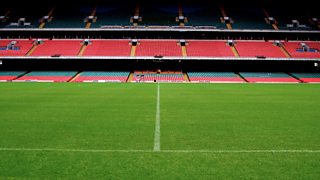Will your football club go out of business?
The surreal sight of football matches played to a crowd of artificially-cheering cardboard cut-outs was a particularly striking example of how we’ve innovatively adapted to a socially distanced world. With the easing of lockdown, 2,500 Brighton fans recently attended a friendly against Chelsea, spaced out as much as possible to adhere to distancing guidelines. By October, thousands of other football fans hope to follow suit. But with a fraction of spectators allowed to return to stadiums, will football clubs be the next business casualties of the pandemic?
In The Briefing Room, David Aaronovitch and guests find out how the pandemic has hit football where it hurts, and ask the question – Does it really matter if football clubs go bust?

Where does the money in football come from?
The year 1992 saw a seismic shift in the football world, when England’s top clubs formed the Premier League, signing a hefty broadcasting deal with Sky TV. Last year alone, the Premier League clubs generated a staggering £5.1 billion, two thirds of which came from TV deals. Kieran Maguire, one of the country’s leading football finance experts, explains that smaller Premier League clubs receive around £100 million in TV funding, whereas clubs in the EFL Championship will receive just £7 million. According to Kieran, a club such as Bournemouth will generate as much as 88% of their funding from broadcasting fees, but are more constrained by the relatively small size of their 11,000 capacity stadium. Clubs whose venues can house over 60,000 spectators are less heavily dependent on broadcasting, as they have a heftier match day revenue.
How has the pandemic affected football?
For League Two clubs, who might make as much as half their revenue on a match day, the pandemic could prove fatal: after all, cardboard cut-outs won’t pay their bills. As Kieran says: “If we can’t return to football taking place before an audience… then it’s difficult to see how clubs can survive financially, and therefore the risk of a significant number of clubs going into administration – or worse – has got to be a very high probability.”

The football clubs at risk from Covid-19
A clip from The Briefing Room: Football and the pandemic, presented by David Aaronovitch.
It’s not just low turnouts at games that can damage a club’s takings: when television companies go bankrupt, the clubs themselves are put in a precarious position. When clubs are relegated, it’s not just their reputation that’s at stake: poor performance can also make clubs take a financial nosedive, as moving down a league loses them their broadcast backing. Kieran explains how drastic this can be: if a leading club is knocked out of the Premier League, the TV revenue they would subsequently receive would cover the average salaries of just two of their players! While the average wage of a male Premier League footballer is £3 million, the average salary of a women’s Super League footballer is £27,500.
If a leading club is knocked out of the Premier League, the TV revenue they would subsequently receive would cover the average salaries of just two of their players!Football finance expert Kieran Maguire
Can women’s football weather the pandemic?
Unlike the men’s Premier League, women’s football is dependent on commercial investment and sponsorship, and for top women’s club Manchester City, a tiny six per cent of their revenue is from broadcasting. Dr Alex Culver, a senior lecturer in sports business, explains that women’s football is financially dependent on men’s, so if men’s football takes a hit, women’s football teams are pulled down with them. No specific financial support was offered to the women’s Super League by the Football Association when the pandemic brought the sport to a stop back in March, and financial support from the Premier League was not effected until the 2021 season. Alex explains that the “precarious position” the players were left in “has resulted in a high level of mental health concerns for professional women footballers.”

If men鈥檚 football takes a hit, women鈥檚 football teams are pulled down with them.
Alex's recent research conducted with Durham University has uncovered other ways that women’s football will be disproportionately affected by the pandemic. It was found that fans appreciated the way in which the players interacted with them after matches and on social media in a way that was unique to the women’s sport. “There’s a concern that if the game is continued to be played behind closed doors because of the Covid-19 pandemic, fans will lose that accessibility with players, and they’ll stop being interested in women’s football,” explains Alex. She says that this could lead to a “domino effect”, with fewer players, fewer spectators and therefore lower revenues.
Does it matter if football clubs go out of business?

For those who take no pleasure from the territorial pursuit of an air-filled sphere around a field, the potential downfall of numerous football teams, particularly those below the Premier League, may not feel like a great loss. Professor of Political Economy, Helen Thompson, defends the sport: “It has provided a literal season, a structure of time through the year, and it provides a climax at the end of that. People mark their lives by what happens in football seasons of the clubs that they support.” For cities which have a dedicated team, she explains, it is an important part of the local economy, so by extension, she says, “the fact that these clubs are in difficulty means that the local economies are in difficulty too.” Sociologist and author David Goldblatt explains that there is an emotional significance attached to football too, particularly with smaller, local clubs. For their fans they provide “a central source of identity, meaning, personal narrative that binds them to a wider community and that towns and cities embrace.” Football has huge economic and cultural worth, and as a sport its health benefits are not to be ignored either. For many, five-a-side games with friends are a key way of keeping fit, blowing off steam and having meaningful social contact with others. The pandemic may have knocked football back, but the game isn’t over yet.
More from Radio 4
-
![]()
The Briefing Room: Football and the pandemic
David Aaronovitch examines the state of the football industry.
-
![]()
Fair game? The Secrets of football betting
Has the beautiful game forged a questionable alliance with a risky business?
-
![]()
15 of the most poetic phrases from the beautiful game
Take a look at the language, and in particular, the clich茅s of football. Back of the net!
-
![]()
Mysterious superstitions in sport
The diverse range of sporting superstitions and the difference they make.




